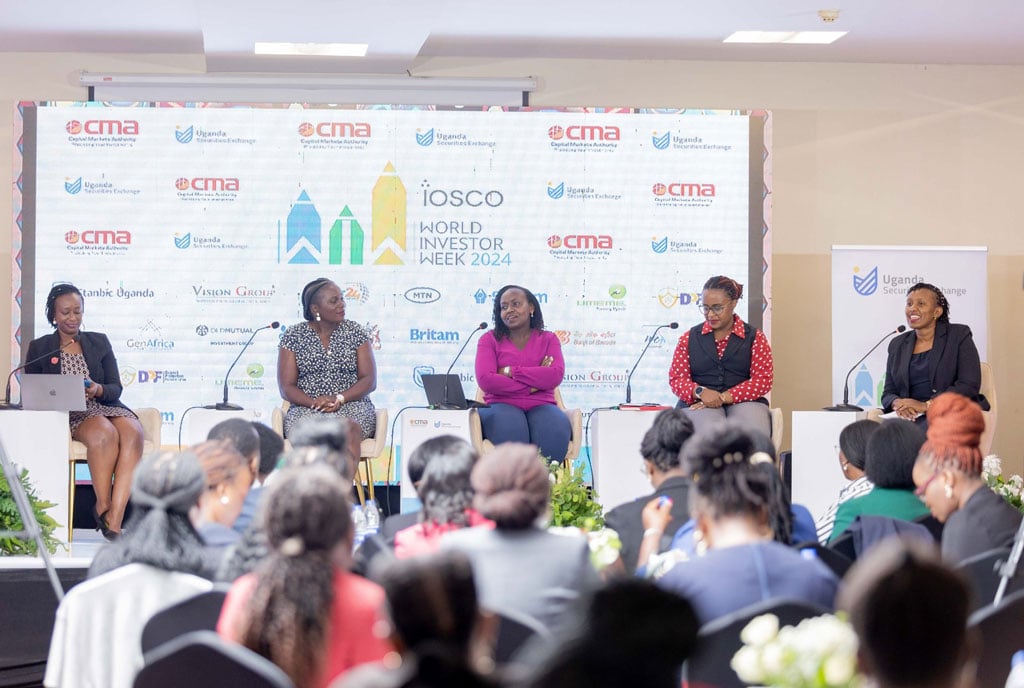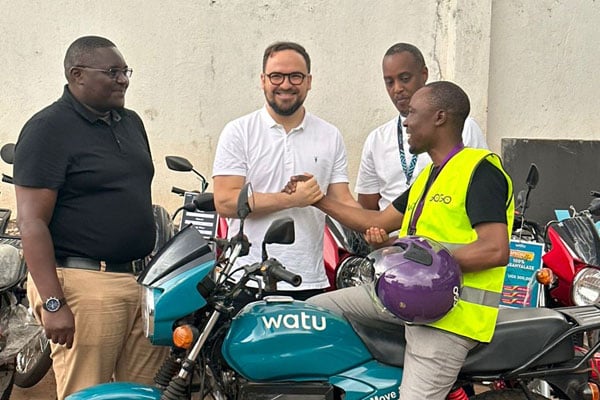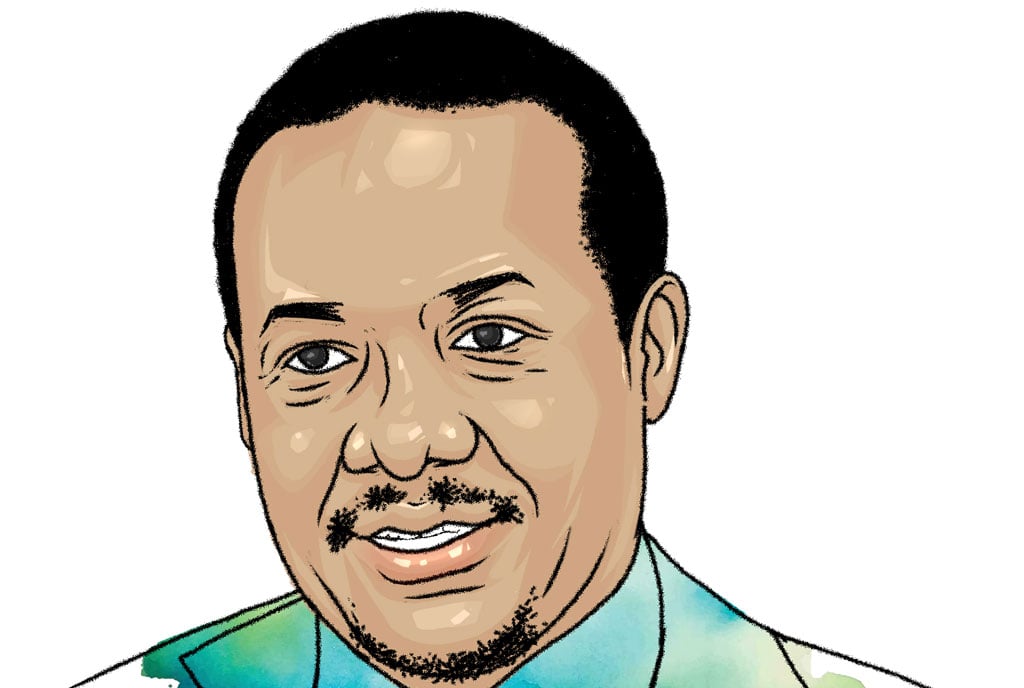
Left to right: DFF Uganda portfolio relationship manager Brenda Amony, MTN Mobile Money Uganda chief financial officer Sarah Bateta Okwi, Sanlam Investments Uganda portfolio manager Eileen Ninsiima, and Capital Markets Consultant Susan Namaganda during the World Investors Week women’s conference. PHOTO | COURTESY OF UGANDA SECURITIES EXCHANGE
Ms Susan Namaganda seemed like any other undergraduate student at Uganda Christian University (UCU) slightly above a decade ago.
She was working toward a Bachelor’s in Business Administration; yet one difference marked her out—she had an unyielding interest in the stock market.
While others saw it on television and moved on, she felt compelled to dive deeper, consulting anyone who could guide her toward the world of finance.
As she entered her third year of study, Ms Namaganda was clear about one thing—she didn’t want accounting.
“I prayed about it, asking God to keep me from accounting,” she recalls. “Guess what? We became the first UCU business class to split into finance and accounting. My name was first on the finance list, which felt like fate calling.”
After graduation, she applied to Dyer & Blair, a brokerage firm, while dabbling in entrepreneurship—selling clothes and airtime at campus and expos to earn her first million shillings. But her interest was reignited when she heard about a listing of Umeme, Uganda’s power distributor, on the local stock exchange.
Without connections, she barely knew where to start, but fate intervened again when a friend casually invited her to work on a ‘certain transaction’. Only later did she realise it was with Crested Capital, a brokerage firm she’d never considered.
In early 2013, after months without a market job and reluctantly beginning her Chartered Public Accountant (CPA) studies to appease her father, Crested Capital called her for an interview.
Ms Namaganda's journey began with an internship where perseverance became her guide. Her first big project was NIC Holdings’ rights issue, valued at Shs8.4b in November 2013.
“Working with small clients, sometimes with just 100 shares, taught me humility and diligence,” she says.
Ms Namaganda eventually rose to head operations, under the mentorship of Robert Baldwin, the current chief executive officer of Crested Capital.
Her proudest moments came during transactions for MTN and Airtel in 2010 and 2013, telecoms that raised just above Shs700b—Shs535.94b and Shs211.43b, respectively—on Uganda’s Securities Exchange (USE).
“For MTN’s first meetings, I was the only woman at the table, ensuring we were the retail broker to execute the deal. For Airtel, I was the one who even received the email for NSSF’s 200-billion investment,” she adds during a World Investors Week women’s conference organised by Capital Markets Authority (CMA) and USE two Wednesdays ago in Kampala.
Women like her are scarce in Uganda, which affects their earnings, according to a pair of CMA executives interviewed for this article, and multiple economists are concerned that this is detrimental not only to them but also to the entire economy.
Uganda’s wealth rests on three pillars: produced capital (factories and infrastructure), natural capital (land and resources), and the biggest by far, human capital—the future earnings of its people.
Human capital
Human capital constitutes two-thirds of Uganda's wealth, yet a significant portion is lost due to gender inequality in earnings, according to data from Unesco. This gender gap is not merely a social issue; it drains national wealth.
Despite this, Uganda's national wealth has steadily increased, both in total and per capita. The World Bank estimates that national wealth rose by 43.9 percent between 2011 and 2018, reaching $445b. Human capital, valued at $325b, comprises 73 percent of this wealth, followed by produced capital at $78b and natural capital at $59b. Notably, oil reserves are not included in these figures as production has not yet began, but they are expected to enhance future estimates.
Since 2011, Uganda's national wealth has grown faster than its population, leading to an increase in per capita wealth from $9,227 to $10,407—a 12.8 percent rise.
However, while national wealth improved, GDP per capita fluctuated, ending slightly lower in 2018 than in 2011, primarily due to the economic fallout from the Covid-19 pandemic.
Unesco identifies gender inequality as a key barrier to Uganda's wealth growth, noting that women’s human capital wealth is only 75.6 percent of men’s ($140 billion compared to $185 billion).
Although women represent half of Uganda’s adult population, they account for just 43.1 percent of the country’s human capital wealth.
Strength of women
In a recent financial inclusion report, Unesco analysts argue that if women earned as much as men, Uganda's overall human capital and national wealth would significantly increase, unlocking substantial economic gains. They highlight how gender inequality—exemplified by low educational attainment for girls and the prevalence of child marriage and early childbearing—contributes to high fertility rates, exacerbating the country's population growth, which was 3.2 percent in 2021.
Anecdotal data from domestic economists suggests that providing universal secondary education for girls could nearly eradicate child marriages, reduce fertility rates, and lower population growth.
Addressing gender inequality in this manner could enhance per capita wealth and unlock a demographic dividend, improving living standards nationwide. Additionally, the World Bank recently noted that women-led micro and medium enterprises (MMEs) in Uganda struggle with inadequate capital, hindering their growth. To thrive, these businesses need access to patient capital as their entrepreneurs gain expertise.
With women comprising more than 51 percent of Uganda's population, their potential to drive investments is immense.
Challenges
The challenge lies in transforming these statistics to empower female entrepreneurs, enabling them to engage confidently in Uganda’s capital markets.
A key issue is the lack of sex-disaggregated data, critical for evaluating gender ownership and guiding regulators on reducing investment-related income inequalities. Uganda’s financial market is not solely an old boys' club. Women like Ms Namaganda have successfully navigated major transactions in Uganda’s stock exchange, demonstrating women’s potential in this space.
Ms Namaganda, an investment banker with over a decade of experience, notes that women often face negotiation challenges, impacting their earnings and investment capacity. She calls for more qualified women in the sector to strengthen bargaining power, observing that “men tend to negotiate fiercely”.
Eileen Lynette Ninsiima, portfolio manager at Sanlam Investments East Africa Uganda, observes that women tend to delay financial decisions, which can hinder their growth. She says women often prefer safe, low-risk options, like cash, over higher-return investments.
Ms Ninsiima has played a central role in growing Sanlam’s assets from Shs980b in 2017 to Shs2 trillion in 2024, managing more than Shs600b in client portfolios.
Many women also face financing hurdles. Limited collateral and property ownership make qualifying for loans challenging, and cultural biases often label women as riskier borrowers, even though data shows they have high repayment rates.
Financial education and business skills gaps further hinder their access to larger funding and while microfinance provides small loans, it rarely supplies the capital needed for women-owned businesses to scale beyond the ‘micro’ level."
Possible solutions
Tackling barriers to women’s economic participation requires a comprehensive approach: policy reforms, tailored financial products, enhanced financial education, and cultural shifts toward gender equity.
Sarah Bateta Okwi, the chief financial officer (CFO) at MTN Mobile Money Uganda, reports that of the company's 13 million active users, 47 percent are women, with 44 percent regularly using Mobile Money—highlighting fintech's role in increasing financial access.
In 2021, only 10 percent of Ugandans held bank accounts, while 53 percent relied on Mobile Money, thanks to fintechs’ use of accessible technology. By leveraging Artificial Intelligence (AI) and blockchain, fintechs offer innovative solutions, including microloans, peer-to-peer lending, and personalised financial products, which extend inclusion where traditional banking falls short.
For women in business, meticulous financial record-keeping is crucial. “Without accurate records, tracking growth and attracting investors is impossible,” says Bateta.
Brenda Amony, portfolio relationship manager at Deal Flow Facility (DFF) under FSD Uganda, stresses the importance of formalising businesses for better access to capital. Unlike bank loans, private equity offers capital without immediate returns, helping businesses focus on long-term growth.
Ms Amony advises women to use digital tools for operations and marketing, making businesses more resilient and independent. She encourages women to engage deeply in all business aspects—financials, management, and structure—to attract investors within minutes of pitching. Although strict lending criteria challenge many, Ms Amony believes that with viable, well-structured businesses, female entrepreneurs can secure the financing they need.
Govt move
The government has made strides in addressing gender inequality, starting with the 1995 Constitution’s prohibition of laws and customs that harm women’s welfare. The Uganda Law Reform Commission has since reviewed personal laws for gender equality.
The 1997 National Gender Policy (NGP) established gender mainstreaming across sectors, building awareness and fostering partnerships for gender equality. Policies like the 2006 National Equal Opportunities Policy and the 2007 Uganda Gender Policy promote affirmative action, while the National Development Plan II (2015–2020) incorporates gender equality into national planning.
Uganda has also adopted the Sustainable Development Goals, especially SDG 5, to empower women and girls.
The Judiciary Gender Policy further supports equal treatment for all. However, gender inequality persists, and it remains to be seen how government and private sector efforts together will advance women’s financial inclusion.







